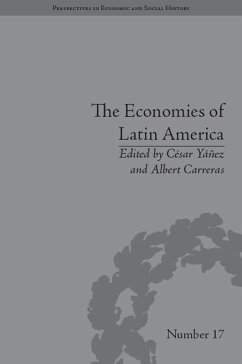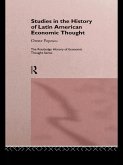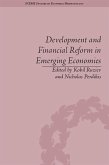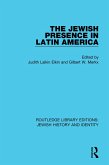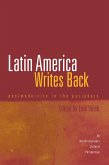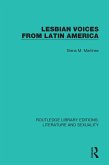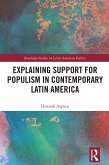50,95 €
50,95 €
inkl. MwSt.
Sofort per Download lieferbar

25 °P sammeln
50,95 €
Als Download kaufen

50,95 €
inkl. MwSt.
Sofort per Download lieferbar

25 °P sammeln
Jetzt verschenken
Alle Infos zum eBook verschenken
50,95 €
inkl. MwSt.
Sofort per Download lieferbar
Alle Infos zum eBook verschenken

25 °P sammeln
- Format: PDF
- Merkliste
- Auf die Merkliste
- Bewerten Bewerten
- Teilen
- Produkt teilen
- Produkterinnerung
- Produkterinnerung

Bitte loggen Sie sich zunächst in Ihr Kundenkonto ein oder registrieren Sie sich bei
bücher.de, um das eBook-Abo tolino select nutzen zu können.
Hier können Sie sich einloggen
Hier können Sie sich einloggen
Sie sind bereits eingeloggt. Klicken Sie auf 2. tolino select Abo, um fortzufahren.

Bitte loggen Sie sich zunächst in Ihr Kundenkonto ein oder registrieren Sie sich bei bücher.de, um das eBook-Abo tolino select nutzen zu können.
The economic backwardness of Latin America and the Caribbean has long been discussed, but seldom been the subject of such a wide-ranging quantitative study. The twelve essays in this collection present a twenty-first-century analysis of a long-term issue, providing extensive geographical coverage and allowing reinterpretations of the past.
- Geräte: PC
- ohne Kopierschutz
- eBook Hilfe
- Größe: 2.44MB
Andere Kunden interessierten sich auch für
![Studies in the History of Latin American Economic Thought (eBook, PDF) Studies in the History of Latin American Economic Thought (eBook, PDF)]() Oreste PopescuStudies in the History of Latin American Economic Thought (eBook, PDF)50,95 €
Oreste PopescuStudies in the History of Latin American Economic Thought (eBook, PDF)50,95 €![Development and Financial Reform in Emerging Economies (eBook, PDF) Development and Financial Reform in Emerging Economies (eBook, PDF)]() Kobil RuzievDevelopment and Financial Reform in Emerging Economies (eBook, PDF)42,95 €
Kobil RuzievDevelopment and Financial Reform in Emerging Economies (eBook, PDF)42,95 €![Cultural Continuity in Advanced Economies (eBook, PDF) Cultural Continuity in Advanced Economies (eBook, PDF)]() Gustav SchachterCultural Continuity in Advanced Economies (eBook, PDF)34,95 €
Gustav SchachterCultural Continuity in Advanced Economies (eBook, PDF)34,95 €![The Jewish Presence in Latin America (eBook, PDF) The Jewish Presence in Latin America (eBook, PDF)]() The Jewish Presence in Latin America (eBook, PDF)35,95 €
The Jewish Presence in Latin America (eBook, PDF)35,95 €![Latin America Writes Back (eBook, PDF) Latin America Writes Back (eBook, PDF)]() Latin America Writes Back (eBook, PDF)56,95 €
Latin America Writes Back (eBook, PDF)56,95 €![Lesbian Voices From Latin America (eBook, PDF) Lesbian Voices From Latin America (eBook, PDF)]() Elena M. MartínezLesbian Voices From Latin America (eBook, PDF)39,95 €
Elena M. MartínezLesbian Voices From Latin America (eBook, PDF)39,95 €![Explaining Support for Populism in Contemporary Latin America (eBook, PDF) Explaining Support for Populism in Contemporary Latin America (eBook, PDF)]() Dinorah AzpuruExplaining Support for Populism in Contemporary Latin America (eBook, PDF)41,95 €
Dinorah AzpuruExplaining Support for Populism in Contemporary Latin America (eBook, PDF)41,95 €-
-
-
The economic backwardness of Latin America and the Caribbean has long been discussed, but seldom been the subject of such a wide-ranging quantitative study. The twelve essays in this collection present a twenty-first-century analysis of a long-term issue, providing extensive geographical coverage and allowing reinterpretations of the past.
Dieser Download kann aus rechtlichen Gründen nur mit Rechnungsadresse in A, B, BG, CY, CZ, D, DK, EW, E, FIN, F, GR, HR, H, IRL, I, LT, L, LR, M, NL, PL, P, R, S, SLO, SK ausgeliefert werden.
Produktdetails
- Produktdetails
- Verlag: Taylor & Francis
- Seitenzahl: 256
- Erscheinungstermin: 6. Oktober 2015
- Englisch
- ISBN-13: 9781317320890
- Artikelnr.: 43480493
- Verlag: Taylor & Francis
- Seitenzahl: 256
- Erscheinungstermin: 6. Oktober 2015
- Englisch
- ISBN-13: 9781317320890
- Artikelnr.: 43480493
- Herstellerkennzeichnung Die Herstellerinformationen sind derzeit nicht verfügbar.
César Yáñez (PhD: Universitat Autonoma de Barcelona, 1994) is full professor, Department of Economic History and Institutions, University de Barcelona (Spain) and member of the board of the Centre d'Estudis Antoni de Capmany. His latest publications are: with M. Badia-Miró, 'El consumo de automóviles en América Latina y el Caribe, 1902-1930', El Trimestre Económico, 310 (2010); M. Rubio, C. Yáñez, M. Folchi and A. Careras, 'Economic Modernization in Latin America and the Caribbean between 1890 and 1925: A View from Modern Energy Consumption', Economic History Review, 63:3 (2010); 'Importaciones de bienes de consumo duradero en América Latina en 1925: los relojes y los automóviles', Revista de Historia Económica, 2 (2008); C. Yáñez, M. Rubio and A. Carreras, 'Modernización económica en América Latina y el Caribe entre 1890 y 1925: una mirada desde el consumo de energía', in M. Rubio and R. Bertoni (eds), Energía y desarrollo en el siglo XX. Uruguay en el marco latinoamericano (Universitat Pompeu Fabra, Barcelona, and Universidad de la República, Montevideo, 2008); C. Yáñez and M. Badia-Miró, 'Las importaciones de relojes y automóviles en América Latina durante 1925. Una aproximación desde el punto de vista de la renta y su distribución', in Revista de Historia Industrial, 35:3 (2008).,
Albert Carreras (PhD: Universitat Autonoma de Barcelona, 1983) is full professor, Department of Economics and Business, Universitat Pompeu Fabra, Barcelona. Dean of the School of Economics and Business. Prince of Asturias Visiting Professor, BMW Center for German and European Studies, Edmund A. Walsh School of Foreign Service, Georgetown University (2007-8). Professor, Department of History and Civilization, European University Institute, Florence (1989-94). Visiting scholar at University of California, Barkeley (1988-9). President, European Business History Association (2010-11). Vice-president, Asociación Española de Historia Económica (2009-11). Chairman (since 2009), Research Council, European University Institute, Florence. His latest publications are: with C. Josephson 'Aggregate Growth, 1870-1914: Growing at the Production Frontier', in S. Broadberry and K. O'Rourke (eds), Cambridge Economic History of Modern Europe, 2 vols (Cambridge: Cambridge University Press, 2010), vol. 2, pp. 30-58; M. Rubio, C. Yáñez, M. Folchi and A. Careras 'Economic Modernization in Latin America and the Caribbean between 1890 and 1925: A View from Modern Energy Consumption', Economic History Review, 63:3 (2010), pp. 769-804; with E. Felice, 'L'industria italiana dal 1911 al 1938: ricostruzione della serie del valore aggiunto e interpretazioni', Rivista di Storia Economica, 26:3 (2010), pp. 285-333; with X. Tafunell, Historia económica de la España contemporánea (1789-2009) (Barcelona: Crítica, 2010).
Albert Carreras (PhD: Universitat Autonoma de Barcelona, 1983) is full professor, Department of Economics and Business, Universitat Pompeu Fabra, Barcelona. Dean of the School of Economics and Business. Prince of Asturias Visiting Professor, BMW Center for German and European Studies, Edmund A. Walsh School of Foreign Service, Georgetown University (2007-8). Professor, Department of History and Civilization, European University Institute, Florence (1989-94). Visiting scholar at University of California, Barkeley (1988-9). President, European Business History Association (2010-11). Vice-president, Asociación Española de Historia Económica (2009-11). Chairman (since 2009), Research Council, European University Institute, Florence. His latest publications are: with C. Josephson 'Aggregate Growth, 1870-1914: Growing at the Production Frontier', in S. Broadberry and K. O'Rourke (eds), Cambridge Economic History of Modern Europe, 2 vols (Cambridge: Cambridge University Press, 2010), vol. 2, pp. 30-58; M. Rubio, C. Yáñez, M. Folchi and A. Careras 'Economic Modernization in Latin America and the Caribbean between 1890 and 1925: A View from Modern Energy Consumption', Economic History Review, 63:3 (2010), pp. 769-804; with E. Felice, 'L'industria italiana dal 1911 al 1938: ricostruzione della serie del valore aggiunto e interpretazioni', Rivista di Storia Economica, 26:3 (2010), pp. 285-333; with X. Tafunell, Historia económica de la España contemporánea (1789-2009) (Barcelona: Crítica, 2010).
Introduction: Latin American Economic Backwardness Revisited
César Yáñez
Albert Carreras; Chapter 1
Albert Carreras; Chapter 2
María del Mar Rubio
Mauricio Folchi; Chapter 3 Latin America and its Main Trade Partners
1860-1930: Did the First World War Affect Geographical Patterns?
Marc Badia-Miró
Anna Carreras-Marín; Chapter 4 The Structure of Latin American Investment in Equipment Goods During the Mature Period of the First Globalization
Xavier Tafunell; Chapter 5 Factorial Distribution of Income in Latin America
1950-2000: New Series From the National Account Data
Vicente Neira Barría; Chapter 6
Frank Notten; Chapter 7 Economic Modernization in Adverse Institutional Environments: The Cases of Cuba and Chile
César Yáñez; Chapter 8 Capital Goods Imports
Machinery Investment and Economic Development in the Long Run: The Case of Chile
André A. Hofman
Cristián Ducoing; Chapter 9
José Jofré González; Chapter 10
Santiago Colmenares; Chapter 11
José Alejandro
Peres Cajías; Chapter 12
Carolina Román Ramos;
César Yáñez
Albert Carreras; Chapter 1
Albert Carreras; Chapter 2
María del Mar Rubio
Mauricio Folchi; Chapter 3 Latin America and its Main Trade Partners
1860-1930: Did the First World War Affect Geographical Patterns?
Marc Badia-Miró
Anna Carreras-Marín; Chapter 4 The Structure of Latin American Investment in Equipment Goods During the Mature Period of the First Globalization
Xavier Tafunell; Chapter 5 Factorial Distribution of Income in Latin America
1950-2000: New Series From the National Account Data
Vicente Neira Barría; Chapter 6
Frank Notten; Chapter 7 Economic Modernization in Adverse Institutional Environments: The Cases of Cuba and Chile
César Yáñez; Chapter 8 Capital Goods Imports
Machinery Investment and Economic Development in the Long Run: The Case of Chile
André A. Hofman
Cristián Ducoing; Chapter 9
José Jofré González; Chapter 10
Santiago Colmenares; Chapter 11
José Alejandro
Peres Cajías; Chapter 12
Carolina Román Ramos;
Introduction: Latin American Economic Backwardness Revisited
César Yáñez
Albert Carreras; Chapter 1
Albert Carreras; Chapter 2
María del Mar Rubio
Mauricio Folchi; Chapter 3 Latin America and its Main Trade Partners
1860-1930: Did the First World War Affect Geographical Patterns?
Marc Badia-Miró
Anna Carreras-Marín; Chapter 4 The Structure of Latin American Investment in Equipment Goods During the Mature Period of the First Globalization
Xavier Tafunell; Chapter 5 Factorial Distribution of Income in Latin America
1950-2000: New Series From the National Account Data
Vicente Neira Barría; Chapter 6
Frank Notten; Chapter 7 Economic Modernization in Adverse Institutional Environments: The Cases of Cuba and Chile
César Yáñez; Chapter 8 Capital Goods Imports
Machinery Investment and Economic Development in the Long Run: The Case of Chile
André A. Hofman
Cristián Ducoing; Chapter 9
José Jofré González; Chapter 10
Santiago Colmenares; Chapter 11
José Alejandro
Peres Cajías; Chapter 12
Carolina Román Ramos;
César Yáñez
Albert Carreras; Chapter 1
Albert Carreras; Chapter 2
María del Mar Rubio
Mauricio Folchi; Chapter 3 Latin America and its Main Trade Partners
1860-1930: Did the First World War Affect Geographical Patterns?
Marc Badia-Miró
Anna Carreras-Marín; Chapter 4 The Structure of Latin American Investment in Equipment Goods During the Mature Period of the First Globalization
Xavier Tafunell; Chapter 5 Factorial Distribution of Income in Latin America
1950-2000: New Series From the National Account Data
Vicente Neira Barría; Chapter 6
Frank Notten; Chapter 7 Economic Modernization in Adverse Institutional Environments: The Cases of Cuba and Chile
César Yáñez; Chapter 8 Capital Goods Imports
Machinery Investment and Economic Development in the Long Run: The Case of Chile
André A. Hofman
Cristián Ducoing; Chapter 9
José Jofré González; Chapter 10
Santiago Colmenares; Chapter 11
José Alejandro
Peres Cajías; Chapter 12
Carolina Román Ramos;
